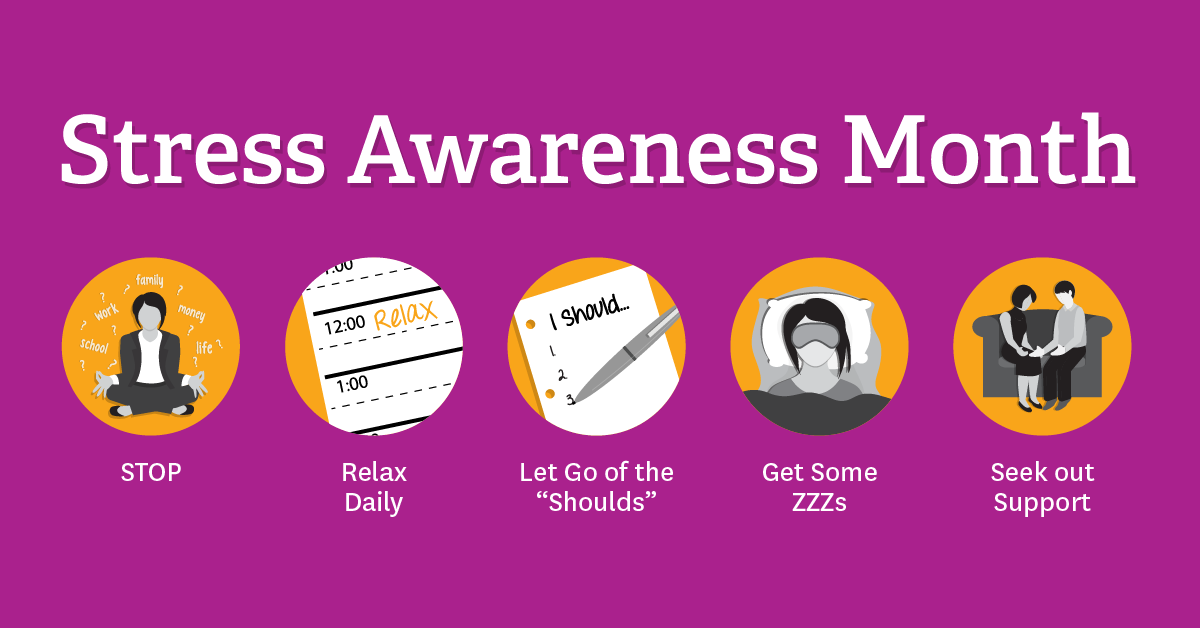
April is #StressAwarenessMonth; this is a great opportunity to assess the sources of stress in your life, learn about effective coping skills and work on ways to reduce the stress you experience on a daily basis. Whether you're getting prepared for exams, dealing with poor health, financial issues, or familial problems, stress can be overwhelming and impact health in a big way.
Statistics show that 1/3 of Canadians feel that they are constantly under stress trying to accomplish more than they can handle, that 2% of Canadian workers reported that they were on the verge of a breakdown, and that 50% of Canadian workers ages 25-44 worry that they do not spend enough time with friends and family.
Stress is a normal response to situational pressures or demands, especially if they are perceived as threatening or dangerous. Stress is the result of brain chemicals or hormones produced by the adrenal glands surging through the body. These hormones (Cortisol and Adrenaline among a few others) make people sweat, breathe quicker, tense their muscles and prepare to take action. When this happens, a person's built-in alarm system—their “fight-or-flight” response— becomes activated to protect them.
/mgl-integratedhealthcentre-ca/13524d5b-af69-41ce-cde5-b6b5d1b11ef9.jpeg)
A certain amount of stress is a normal part of daily life. Small doses of stress help people meet deadlines, be productive and arrive on time for important events. However, long-term stress can become harmful. When stress becomes overwhelming and prolonged, which is becoming more common in today's world, the systemic inflammation becomes chronic, and with that the risks for mental health problems and medical problems increase.
Long-term stress increases the risk of mental health problems such as anxiety and depression, substance use problems, sleep problems, pain and bodily complaints such as muscle tension. It also increases the risk of medical problems such as headaches, gastrointestinal problems, a weakened immune system, difficulty conceiving, high blood pressure, cardiovascular disease and stroke.
Adrenal Fatigue
Though debated among most MDs, Naturopaths and Functional Medicine Practitioners alike agree that symptoms of adrenal fatigue are wide spread and often misdiagnosed. A relatively new term, “adrenal fatigue” was proposed as a new condition in 1998 by Dr. James L. Wilson, a naturopath and chiropractor. His assumption was that an overstimulation of the adrenal glands (or “adrenals”) by chronic stress over time could lead to an inconsistent level of cortisol in the bloodstream, either way above or below the standard amount.
/mgl-integratedhealthcentre-ca/8afeb2cf-f567-41f0-d616-19d904c7f37c.jpeg)
Dr. Wilson described the unique progression of adrenal fatigue throughout the day as follows: you wake up and are unable to function without a significant amount of caffeine, finally feel a boost of energy during the early part of the day, then your energy levels crash around 2 p.m., rise around 6 p.m., fall again around 9 p.m. and then finally peak again at 11 in the evening. Sound familiar?
Currently, no official diagnosis exists for adrenal fatigue and people are either considered to have normal endocrine function or total endocrine failure, like that seen in Cushing’s syndrome or adrenal insufficiency/Addison’s disease. BUT, in groundbreaking news, this month the World Health Organization is recognizing burn-out or adrenal fatigue syndrome as a condition brought out by over-working.
The protective activity of anti-inflammatory and anti-oxidant adrenal hormones like cortisol normally help to minimize reactions like swelling and inflammation in situations ranging from allergies to autoimmune disorders. These hormones closely modulate many metabolic processes, and as a result, these processes can be disrupted or stalled by adrenal fatigue. Some of these processes are as follows:
- the utilization of carbohydrates and fats
- the conversion of fats and proteins into energy
- the distribution of stored fat – especially around your waist (the spare tire) and at the sides of your face
- normal blood sugar regulation
- proper cardiovascular function
- gastrointestinal function
A 2017 study led by Janice Kiecolt-Glaser, director of the Institute for Behavioural Medicine Research at the Ohio State University, found that stress can even override the benefits of healthful eating. Observing 58 women and their inflammatory markers, researchers found that a calm day with a high saturated fat meal had the same effect to the body as a healthy plant based meal on a stressful day. In other words, stress was heightening the inflammatory markers in the body, regardless of diet choices. The findings add to the evidence that stress is a powerful player when it comes to influencing our health. Kiecolt-Glaser's prior research has shown that people who are stressed heal wounds more slowly. She has also demonstrated that stress can promote weight gain by altering metabolism and slowing down calorie-burning.
Health consequences
Over long periods, chronic stress can contribute to the development of a range of physical and mental disorders, including:
- high blood pressure
- heart disease
- high blood pressure
- diabetes
- muscle cramping
- weight gain or obesity
- a weakened immune system
- sexual dysfunction
- gastrointestinal disorders
- skin irritation
- respiratory infections
- autoimmune diseases
- insomnia
- burnout
- depression
- anxiety disorders
- post-traumatic stress disorder, or PTSD
- schizophrenia
How to Manage Stress
- Stay Hydrated! It sounds simple, but it's shockingly common for clients to be unaware that chronic dehydration is effecting their health. People should ideally be drinking half their body weight (lbs) in ounces. So a 160 lb person would want to drink roughly 80 oz of water (2.3 litres).
- Remember to eat: stress can effect appetite, but it's important to keep fuelling your body to ensure it keeps working for you. Small healthy snacks are better than nothing.
- Get enough sleep.
- Get outside! A research paper published this April 2019 found that just 20 minutes of contact with nature (without tech or aerobic exercise) will significantly lower your stress hormone levels.
- Get Physical: physical activity is a type of eustress, or stress that is considered beneficial in that it produces an outlet for built up cortisol.
- Keep a diary: tracking life events or symptom events is a great way to monitor progress and keep detailed info of your condition. Moreover, putting your thoughts onto paper can be very therapeutic.
- Talk to someone (professional or otherwise). Stress can take a lot out of a person and effect every aspect of their life. It's important to know that you're not alone, and communicating your situation again can be very therapeutic.
- Try mindfulness or meditation: take advantage of yoga, free meditation apps/videos online, or the simple 10 breath exercise!
- Say no when you need to (don't take on more than necessary).
- Try herbal or vitamin supplements:
Veeva Stress
/mgl-integratedhealthcentre-ca/fc62ba94-35cf-493b-9fb0-68bfa6104cd1.jpeg)
The first product of its kind in Canada, Veeva Stress Formula was designed to treat stress where it all begins, in the brain. While many other products treat the symptoms or damage caused by stress, our Stress Formula moderates sensitive brain chemistry to actually bring the stress response back into balance, with only 2 capsules per day. Ingredients include lemon balm, Ashwaganda, Rhodiola and 5HTP among others.
Veeva Anxiety
/mgl-integratedhealthcentre-ca/60050747-017b-4e4e-83cd-1896e6467c9f.jpeg)
More and more people are adopting the natural route to treating anxiety, without all the side-effects of prescription medication. Our Anxiety Formula is the first product of its kind to be licensed by Health Canada specifically to treat for anxiety. With only 2 capsules per day, Veeva Anxiety Formula helps relieve anxiety by reducing the occurrence and severity of the five most common components of anxiety. Ingredients include Ashwagandha, Ginseng, Holy Basil, and L-theanine, among others.
Winner of the 2018 National Nutrition award for Best Herbal Product!
Veeva Sleep
/mgl-integratedhealthcentre-ca/04e8ca99-5ab5-4c43-8c36-c7d0fbfef3ef.png)
Our Sleep formula offers a comprehensive approach for those who suffer from sleep difficulties and poor sleep. Ingredients were selected for their unique, individual abilities to reduce the severity of common sleep issues. Ingredients include valerian, skullcap, lemon balm, California poppy and magnesium.
Metagenics Adreset
/mgl-integratedhealthcentre-ca/ee4832a1-efe7-45ab-bc46-f74d2a9dbab7.jpeg)
This herbal complex is designed to support resilience and stamina in individuals who are feeling mild weakness, exahaustion and fatigue due to stress, and promotes mental clarity. Ingredients include Ginseng, Rhodiola, and Cordyceps Mycelium; this formula features highly valued adaptogenic herbs that support a healthy, balanced response to stress.
Exhilarin
/mgl-integratedhealthcentre-ca/be4f6e8b-8d7f-4c2b-9985-47f78b178bc4.jpeg)
Following the ancient and effective model of Ayurvedic medicine, Exhilarin is designed to improve stress tolerance, and is particularly suitable for the average, busy individual who is susceptible to mental strain and becoming “run down” due to a hectic lifestyle and poor diet. Featuring a blend of adaptogenic herbs, this formula assists the body’s natural ability to adapt to stress.
Licroice Plus
/mgl-integratedhealthcentre-ca/a6f36719-2610-4c2c-a252-40384c5f75f0.jpeg)
The typical person who may benefit from Licorice Plus has been exposed to prolonged stress and has difficulty achieving a vigorous adaptive response, which may result from physically exhausted reserves and present in minor achiness, muscle stiffness, and difficulty performing routine tasks.
Metagenics Serenagen
/mgl-integratedhealthcentre-ca/ffdd353f-5393-41c9-b806-6927dda3fc89.jpeg)
Serenagen is a time-tested traditional classic herbal formula that has been used throughout China since the Yuan Dynasty (1279-1368 A.D.). This combination of adaptogenic herbs (including Ginseng and Chinese Asparagus) is used in Chinese medicine to ease anxiety and calm the heart, targeting organs and systems within the body that respond to stress. It provides short-term relief of anxiety and disorientation, and from symptoms such as overheating and flushing associated with anxiety. Serenagen is a good solution for those who are feeling "wired" or jittery, and are unable to relax or sleep due to exhausted physical reserves and stress.
CanPrev Magnesium, GABA & Melatonin Formula
/mgl-integratedhealthcentre-ca/081b22da-a4b9-48f4-d37b-f0f6a0fc145a.png)
Augmenting their Extra Gentle magnesium form with melatonin and GABA, this formulation is designed to help people relax, reset their circadian biological clocks, get better sleep while reducing the time needed to fall asleep for people with delayed sleep phase disorder.
Magnesium is essential in over 800 different enzymatic functions in your body, from DNA synthesis and energy production to proper muscle function and nervous system health. GABA’s natural function is to reduce the activity of the neurons to which it binds. Some researchers believe that one of the purposes that GABA serves is to control the fear or anxiety experienced when neurons are overexcited. Melatonin, the Dracula of hormones, as it's activated by lack of light, is to induce sleep and encourage REM rest.
AOR Ortho Adapt
/mgl-integratedhealthcentre-ca/ec0649d9-3910-4c43-c2a1-15e5e5f5888d.png)
Ortho Adapt is AOR’s premium anti-stress formula, containing adrenal gland extract, adaptogenic botanicals ashwagandha, Rhodiola, licorice and Siberian ginseng, and vitamins C and B5. Adrenal gland extract provides a time-tested way of providing key factors directly to the adrenal glands (a.k.a. the “anti-stress” glands) in a way that single nutrients and botanicals cannot. As one of AOR’s best-selling formulas, the proof is in the results shown with improved energy and better stress coping abilities.
Ortho Adapt is designed to help the body deal with stress effectively, by stimulating the adrenal glands and helping to prevent adrenal insufficiency. Adaptogenic herbs are substances that provide support to the body during times of stress. They activate whole-body, nonspecific defences, redirecting the body’s resources to provide energy for active engagement with any stressor, whether physical, emotional or environmental. Vitamins C and B5 are quickly depleted during stress and are required by the adrenal glands to make stress hormones. All of these factors work together to prevent fatigue and burnout, boost energy levels and support the ability to cope.
For more information, come visit our knowledgable staff at the IHC store and complete our stress questionnaire, or get in-dept advice, treatment and maintenance from Dr. Nik Bair-Patel, Doctor of Chiropractic and certified Functional Medicine practitioner.




